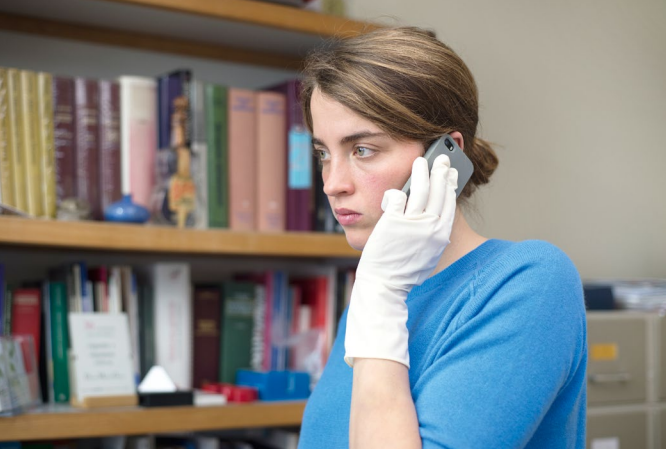In the 20 years since their breakthrough, The Promise, Jean-Pierre and Luc Dardenne have made seven features, all of which ranged from great to sublime, won two Palme d’Ors as well as countless other accolades, and pretty much invented – or at least perfected – a style of social realism so influential and widely imitated that their trademark shaky, over-the-shoulder-cam has become a cliché of the genre. It seemed like the Belgian brothers were incapable of failure. Enter The Unknown Girl, which a charitable viewer might describe as the Dardennes on auto-pilot.
The plot point that kick-starts the narrative is a straightforward one: Jenny (Adèle Haenel), a young doctor working in the Dardennes’ usual stomping ground of Seraing, is in her practice an hour after closing time. There is a buzz on the door, which she ignores, reasoning that if it were an emergency the person would buzz again. In the morning the police arrive. They are investigating the death of a teenage girl the previous night and by checking Jenny’s CCTV recordings they discover that the girl had been the one who buzzed. The footage shows her alarmed and, clearly being pursued, she keeps running when no one answers the door. Likely an illegal African immigrant, the girl had no papers on her; if the police can’t identify her, she will be buried in an unmarked grave. Racked by guilt, Jenny takes it upon herself to discover the girl’s identity, and the film turns into a detective story.

The obsessive extent to which Jenny goes in her quest, considering her objectively minor culpability, is somewhat far-fetched, but the Dardennes have worked with far less likely premises in the past. Think of their second Palme d’Or-winner, The Child, in which the protagonist, upon first holding his newborn, immediately decides to sell him on the black market and manages to do so within what seems like five minutes. There is no way this would ever happen, yet the Dardennes inject the character’s odyssey towards reclaiming his child with so much urgency and gravitas that the story’s flimsy foundations are compensated by the extremely complex moral implications they engender.
Not so in The Unknown Girl. The plot is entirely predicated on the kind of contrived coincidences that any screenwriting 101 professor would urge against, persistently dispelling the film’s realism. Jenny shows the unknown girl’s picture to whoever she meets and, almost invariably, the person knows something. When she makes a domestic call to a teenage patient, the boy denies any knowledge, but his racing pulse tells the human polygraph Jenny otherwise; when she enters a random Internet café simply because there are Africans inside, the woman working behind the counter happens to be the girl’s sister; and so forth.
The directors’ usual Christian-slanted themes – guilt, atonement, redemption – are thus deprived of consequence. Ditto the aspirations to larger social commentary, which are purely rote. The helplessness of illegal immigrants – that their fear of deportation will prevent them from seeking justice when they’re wronged, or that when they’re injured they’ll put their life in peril rather than go to the hospital – is perfunctorily treated, functioning like window-dressing to a schematic plot.

Even the cinematography by the Dardennes’ long-time collaborator Alain Marcoen, usually so instrumental in ensnaring the viewer within their films’ ethical quandaries, is surprisingly flat this time around. Most compositions are strictly functional, and though many scenes are made up of sequence shots, rarely do the shots’ extended durations inject the film with the impetus habitual to such tactics. Instead, the film plods along towards a conclusion that resolves the film’s central mystery so neatly, it’s worthy of a Bond villain’s monologue.
That Jenny is the least-compelling protagonist the Dardennes have ever conceived doesn’t help matters. She is infallibly, impossibly kind. Apart from her selfless endeavor to identify the dead girl, she also in some way assists or rescues every secondary character through self-sacrifice. Further, considering the Dardennes’ filmography as a whole, it can’t help but strike one as peculiar that the first time these champions of the underprivileged come up with a protagonist who isn’t working-class, they elect her as a saint.
The Unknown Girl premiered at the Cannes Film Festival and will be released in the U.S. by Sundance Selects on September 8, 2017. See our coverage below.


